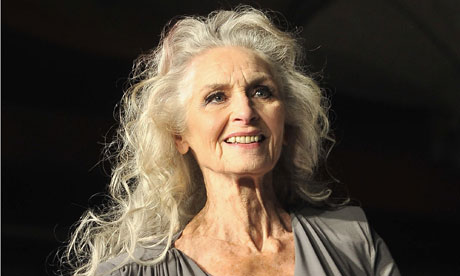
A growing number of older British people – including those in their 70s and 80s – are suffering from low self-esteem and anxieties relating to body image.
Interviewed for the Observer Magazine this weekend, Professor Nichola Rumsey, co-director of the University of the West of England's centre for appearance research, suggests that "as adults, 90% of British women feel body-image anxiety".
She said: "It doesn't wane – many women in their 80s are still anxious about the way their bodies look, which can even affect their treatment in hospital when their health choices are influenced by aesthetics."
Popular opinion suggests that body image-related anxiety is a young person's problem, with recent reports focusing on the age (five years old) at which we are now vulnerable to pressures to conform to an expected ideal. Constant media coverage of the debate on teenagers and their negative relationship with their bodies has served to reinforce the message that it is predominantly young people who suffer such anxieties.
However, Rumsey's studies in Bristol counterbalance this with evidence that these anxieties do not dissipate as the years pass, but merely evolve into different types of concerns about appearance and how we are seen by others.
"We have conducted a study of about 1,200 people, which confirms that appearance-related anxieties persist well into later adulthood," Rumsey said. "At an age where most healthcare professionals focus on controlling pain and body functionality, many patients feel the way they look is as much of a concern, but isn't a legitimate topic of conversation.
"It can cause substantial distress to look in the mirror and see an ageing body, especially if they have very visible conditions such as rheumatoid arthritis or an obvious skin condition, for example, yet in the UK we can be very dismissive of what is often construed as vanity. GPs are not trained to deal with the psychological impact of these anxieties, which can have a significant influence on overall wellbeing."
Even those who are relatively fit and healthy in later years struggled with the idea that they no longer conformed to a youthful ideal, said Rumsey, who recently co-wrote The Oxford Handbook of the Psychology of Appearance. "It is a myth that older people don't care what they look like: the 'normal' signs of ageing can prove very depressing and many people find it hard to see themselves in a positive light when they see a wrinkled face and a sagging body looking back in the mirror. We are now at a point where there is a social stigma around the effects of the natural ageing process, and this can lead to very low self-esteem and the classic signs of body dysmorphic disorder."
These observations are echoed by the increasing number of body image-related cases in older people being seen by Dr Alex Yellowlees, medical director and a consultant psychiatrist at the Glasgow Priory Clinic, who is witnessing "an epidemic of self-consciousness. We are suffering from a collective body dissatisfaction, which is a contagion in our society, and we must acknowledge that it affects all walks of society, young and old.
"It was once the case that we were happy to coast into retirement and relax in our old age, but now even in these later stages of life I am seeing people who are preoccupied with shape, weight and looks in a way that was once the domain of younger people who had yet to find their path or identity in life."
Yellowlees reports an alarming rise in older patients with eating disorders, as all sectors of society strive to achieve what he calls "an unrealistic physical ideal".
"Today everybody is acutely aware of how they look, and our appearance has become a currency we trade on," he said. "That means we value old people less because they don't fit the currency of 'youth'. This in turn leads to a lack of self-esteem in older people, because they don't feel valued by a culture that can't get past superficial image. Appearance is a very fragile currency to trade in because a civilised culture interacts on more sophisticated values such as character, behaviour and language."
In a culture where increasing value is placed on our appearance, Rumsey voices concerns that we must look beyond the superficial. "Older people are the wise ones we have always looked to for their experience and knowledge, and if they are preoccupied with appearance anxieties this becomes the norm for future generations."

